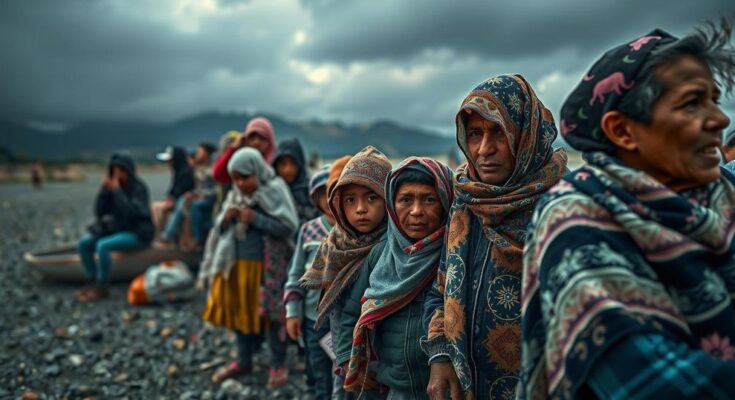The UNHCR has reported that approximately half of the over 120 million displaced individuals are increasingly jeopardized by the climate crisis and conflict. With major countries like Ethiopia, Haiti, and Sudan suffering the combined effects of extreme weather and social unrest, the need for comprehensive climate financing becomes critical. They note a stark disparity in funding availability, which leaves vulnerable populations without adequate assistance to adapt to growing climate challenges.
The United Nations Refugee Agency (UNHCR) has issued a grave warning concerning the impact of the climate crisis on displaced populations worldwide. In a significant report released at COP29 in Baku, it noted that nearly half of the more than 120 million displaced individuals reside in countries severely affected by climate change, such as Ethiopia, Haiti, Myanmar, Somalia, Sudan, and Syria. Furthermore, the report forecasts that by 2040, the number of nations experiencing extreme climate-related hazards is expected to escalate from three to sixty-five, predominantly those housing such populations. A critical concern outlined in the report is the acute lack of climate financing for refugees and host communities. Currently, extremely fragile states receive a meager $2 per person in annual adaptation funding, contrasting sharply with the $161 allotted in stable countries. Moreover, the funding that does reach these fragile areas is disproportionately allocated to capital cities, leaving more vulnerable regions without essential support. The UNHCR emphasized the dire circumstances facing already displaced individuals amid worsening climate conditions, stating that the global climate crisis is exacerbating their suffering. The example of ongoing conflicts, particularly in Sudan, illustrates this trend, where millions have been forced to flee due to violence and climate threats such as flooding. Filippo Grandi, the UN High Commissioner for Refugees, underscored the urgent need for immediate action, highlighting that those affected by the climate emergency are disproportionately impoverished and are often the least responsible for induced carbon emissions. The report calls for a robust response from the international community to prioritize and fund sustainable adaptation measures for affected populations, thereby mitigating further displacement and suffering.
The report by the UNHCR sheds light on the intersection of climate change and forced displacement. It points out that a substantial portion of displaced individuals finds themselves in regions that are not only impacted by conflict but are also experiencing severe climate hazards. Increased extreme weather events, coupled with social and political instability in fragile nations, inhibit the ability of these populations to adapt and survive. Furthermore, the stark imbalance in climate financing distribution indicates that those who are most in need are often overlooked, compounding their vulnerability in the face of these dual crises. As climate change continues to worsen, understanding its implications for displacement and humanitarian needs becomes imperative for global leaders and policymakers. The report serves as a crucial reminder that effective strategies must be implemented to address the needs of the world’s most vulnerable populations amidst the evolving climate crisis.
The UNHCR’s report highlights the disturbing reality that a significant number of forcibly displaced individuals face escalating risks due to the climate crisis, compounded by armed conflict. With a disproportionate lack of funding allocated to fragile states, urgent actions are necessary to protect these vulnerable communities. The urgent call from the UNHCR for funding reallocation and policy inclusion is critical to ensure that those affected by climate change are not left helpless in their plight. Continued dialogue and committed international action are paramount to addressing the dual challenges of displacement and climate adaptation.
Original Source: www.aa.com.tr




